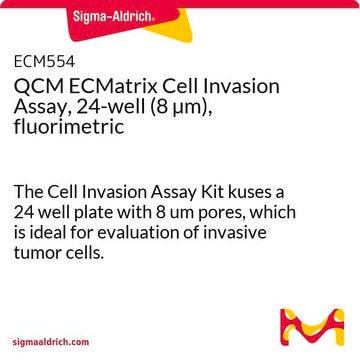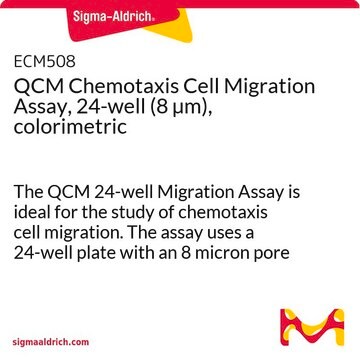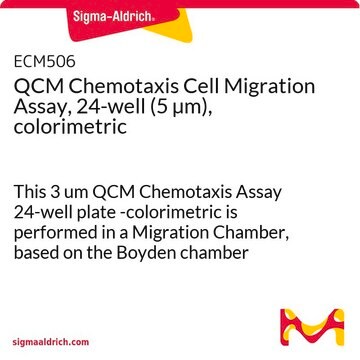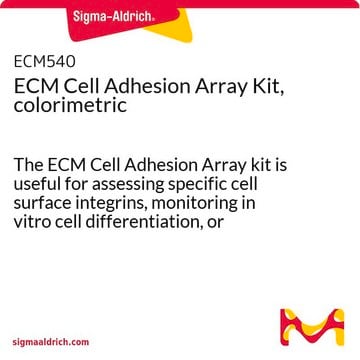ECM210
QCM Endothelial Cell Invasion Assay (24 well, colorimetric)
This QCM Endothelial Cell Invasion Assay provides an in vitro model to quickly screen factors that can regulate endothelial invasion. The assay is performed in an invasion chamber using a basement membrane protein coated on the porous insert.
登入查看組織和合約定價
全部照片(1)
About This Item
分類程式碼代碼:
12352207
eCl@ss:
32161000
NACRES:
NA.84
暫時無法取得訂價和供貨情況
推薦產品
一般說明
Also available: Cell Comb Scratch Assay! Get biochemical data from a scratch assay!Click Here
Introduction
Endothelial cells (EC) invade through the basement membrane (BM) to form sprouting vessels. The invasion process consists of the secretion of matrix metalloproteases (MMP) to degrade basement membrane, the activation of endothelial cells, and the migration of EC across the basement membrane. The understanding of EC invasion is important for studying the mechanism of angiogenesis in injured tissue as well as in disease such as cancer.
Cell migration may be evaluated through several different methods, the most widely accepted of which is the Boyden Chamber assay. The Boyden Chamber system uses two-chamber system which a porous membrane provides an interface between two chambers. Cells are seeded in the upper chamber and chemoattractants placed in the lower chamber. Cells in the upper chamber migrate toward the chemoattractants by passing through the porous membrane to the lower chamber. Migratory cells are then stained and quantified.
Introduction
Endothelial cells (EC) invade through the basement membrane (BM) to form sprouting vessels. The invasion process consists of the secretion of matrix metalloproteases (MMP) to degrade basement membrane, the activation of endothelial cells, and the migration of EC across the basement membrane. The understanding of EC invasion is important for studying the mechanism of angiogenesis in injured tissue as well as in disease such as cancer.
Cell migration may be evaluated through several different methods, the most widely accepted of which is the Boyden Chamber assay. The Boyden Chamber system uses two-chamber system which a porous membrane provides an interface between two chambers. Cells are seeded in the upper chamber and chemoattractants placed in the lower chamber. Cells in the upper chamber migrate toward the chemoattractants by passing through the porous membrane to the lower chamber. Migratory cells are then stained and quantified.
應用
Millipore’s QCM Endothelial Cell Invasion Assay provides an in vitro model to quickly screen factors that can regulate endothelial invasion. The assay is performed in an invasion chamber using a basement membrane protein coated on the porous insert. The level of coating and the pore size is optimized for endothelial cells so the researcher may utilize this kit to mimic physiological condition. After cell invasion has occurred, the researcher can select a staining method to quantify the number of cells that have invaded through the chamber. Millipore offers a colorimetric staining kit (ECM210) and a fluorometric kit staining reagent (ECM211) for both convenience and efficiency.
Research Category
Apoptosis & Cancer
Cell Structure
Apoptosis & Cancer
Cell Structure
包裝
Sufficient for 24 assays
成分
1. Cell Invasion Plate Assembly: (Part No. CS203020) Two 24-well plates each containing 12 ECMatrix-coated 3 m inserts per plate.
2. Cell Stain Solution: (Part No. 90144)* One bottle.
3. Extraction Buffer: (Part No. 90145) One bottle.
4. 24-well Stain Extraction Plate: (Part No. 2005871) One each.
4. 24-well Stain Extraction Plate: (Part No. 2005871) One each.
5. 96-well Stain Quantitation Plate: (Part No. 2005870) One each.
6. Cotton Swabs: (Part No. 10202) Fifty each.
7. Forceps: (Part No. 10203) One each.
2. Cell Stain Solution: (Part No. 90144)* One bottle.
3. Extraction Buffer: (Part No. 90145) One bottle.
4. 24-well Stain Extraction Plate: (Part No. 2005871) One each.
4. 24-well Stain Extraction Plate: (Part No. 2005871) One each.
5. 96-well Stain Quantitation Plate: (Part No. 2005870) One each.
6. Cotton Swabs: (Part No. 10202) Fifty each.
7. Forceps: (Part No. 10203) One each.
儲存和穩定性
Store kit materials at 2° to 8°C for up to their expiration date. Do not freeze.
法律資訊
Accutase is a registered trademark of Innovative Cell Technologies, Inc.
CHEMICON is a registered trademark of Merck KGaA, Darmstadt, Germany
免責聲明
Unless otherwise stated in our catalog or other company documentation accompanying the product(s), our products are intended for research use only and are not to be used for any other purpose, which includes but is not limited to, unauthorized commercial uses, in vitro diagnostic uses, ex vivo or in vivo therapeutic uses or any type of consumption or application to humans or animals.
訊號詞
Danger
危險聲明
危險分類
Eye Irrit. 2 - Flam. Liq. 2
儲存類別代碼
3 - Flammable liquids
閃點(°F)
53.6 °F
閃點(°C)
12 °C
分析證明 (COA)
輸入產品批次/批號來搜索 分析證明 (COA)。在產品’s標籤上找到批次和批號,寫有 ‘Lot’或‘Batch’.。
客戶也查看了
Yingying Yu et al.
Bioengineered, 12(1), 4681-4696 (2021-08-05)
Accumulating evidence indicates that INHBA (Inhibin β-A, a member of the TGF-β superfamily) functions as an oncogene in cancer progression. However, little is known as to how INHBA regulates the progression and aggressiveness of breast cancer (BC). This study explored
Sylvain Tollis et al.
ACS chemical biology, 17(3), 680-700 (2022-02-25)
Background: Lower survival rates for many cancer types correlate with changes in nuclear size/scaling in a tumor-type/tissue-specific manner. Hypothesizing that such changes might confer an advantage to tumor cells, we aimed at the identification of commercially available compounds to guide
文章
Cell based angiogenesis assays to analyze new blood vessel formation for applications of cancer research, tissue regeneration and vascular biology.
以細胞為基礎的血管生成測試,可分析新血管的形成,應用於癌症研究、組織再生和血管生物學。
Active Filters
我們的科學家團隊在所有研究領域都有豐富的經驗,包括生命科學、材料科學、化學合成、色譜、分析等.
聯絡技術服務












